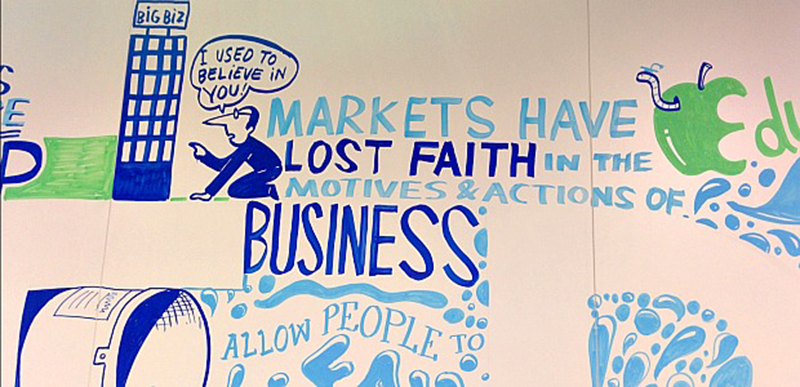Arun Sudhaman 25 Jan 2014 // 12:05PM GMT

Typically, public relations runs into problems because it focuses too much on communication
rather than behaviour. At the World Economic Forum, the opposite appears to be true.
The sessions, for example, demonstrate a considerable focus on corporate governance
and policy, or ‘walking the talk’ in the current parlance.
But the world’s business leaders seem oblivious to the message that Davos sends
out to the rest of the world. For many outside the Davos bubble, all of the ‘consensus-building’
is viewed as empty posturing, a one-week atonement session for sins committed
throughout the rest of the year.
Yet, if nothing else, Davos certainly affords a platform for conversation, one that
has proved particularly useful for the civil society organisations that have proliferated
at the event. Not everyone likes to hear what some of these groups have to say —
at least two senior comms heads told me of their disbelief at the views they had
encountered.
But those views are often more representative of the ‘real world’ than any number
of pronouncements from suited and snow-booted bankers. At the very least, the presence
of so many NGOs has added a dash of reality to proceedings. At best, those organisations
can credibly claim to be shaping, or ‘reshaping’ as the WEF would have it, business
behaviour for the better.
Many comms specialists admit that Davos does have, as Tata Consultancy Services Europe chief comms and marketing officer Abhinav Kumar puts it, a “perception issue”.
Given the event’s remarkable reach and profile, it can seem a little strange to
ask if Davos has a PR problem. The stats from
WEF communications director Adrian Monck are nothing if not beguiling: 31,641
online news items. 2,570 TV spots. 906 videos. 195,417 tweets. 68% more coverage
than 2013.
An army of journalists ensures that there is no lack of coverage. Neither is there
a dearth of PR firepower; the comms world has well and truly arrived at Davos,
led by corporate affairs heads and agency CEOs.
Nevertheless, most of these communications specialists admitted that Davos does
have, as Tata Consultancy Services Europe chief comms and marketing officer Abhinav
Kumar puts it, a “perception issue”.
“At the end of the day Davos is just a platform, the forum itself has no executive
power to implement the change discussed in it,” adds Kumar. “That job rests squarely
on the shoulders of the actors who are present here and need to go back to their
daily operations and walk what they have talked on the snowy slopes.”
HSBC global comms co-head Pierre Goad believes that the event
can appear “odd” to the outside world, who are effectively excluded from
discussions about the world’s future. That dynamic, says Kumar, feeds the “conspiracy
theories and urban legends”.
“There are no secret meetings setting the agenda or decisions being made on issues
that concern us,” says Kumar.
The fact that Kumar needs to spell this out, though, says a lot. Perhaps a little
honesty would help the Davos reputation among the general public. Yes, there is
plenty of agenda-setting about the global issues that matter most; but much of the
WEF’s appeal stems from the ability to do business and build relationships at the
many fringe events that punctuate the week.
This is not exactly ‘reshaping the world’, but it is a crucial element of business,
made more palatable by the evident optimism from improving economic sentiment. Ultimately,
business leaders would probably benefit from a more credible assessment of why they
attend Davos. Now that would really be ‘walking the talk’.


































.jpg)

















